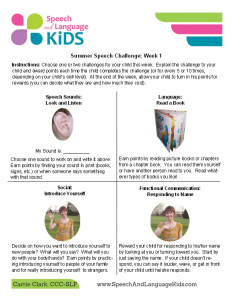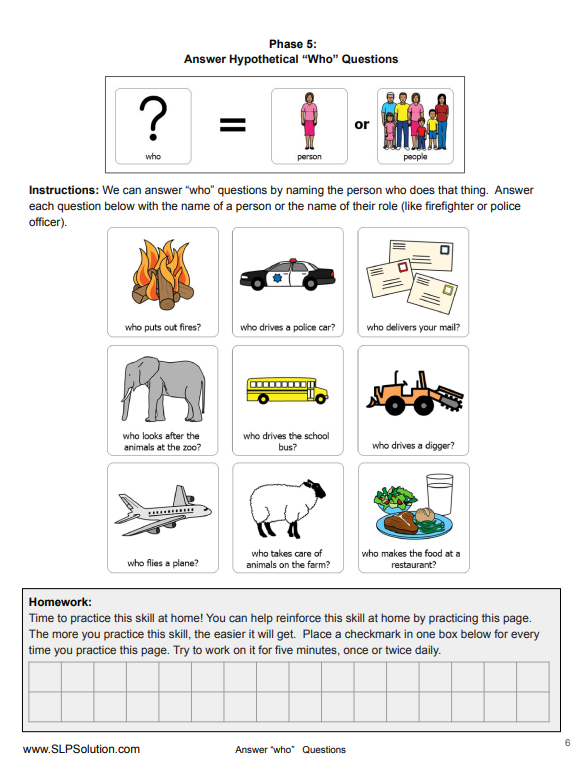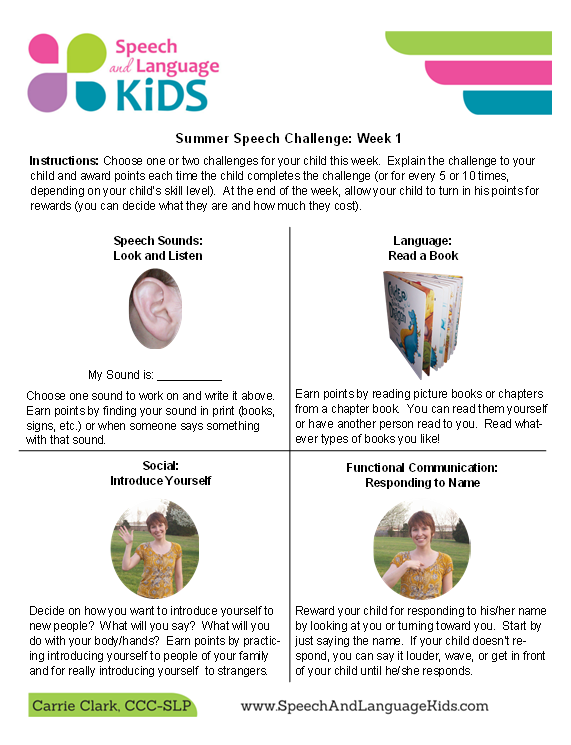Summer Speech Therapy Homework – Free Printables!
School’s out and summer is here! Huzzah!! I hope that summer vacation means lots of fun quality time for you and your children. Though, if you’re like our house, it just means mad chaos and feeling like a chicken with your head cut off. But I’m sure you’re more organized than me! 😉
Summer Speech Therapy Homework Challenge:
One question I hear a lot from clients is “what can I do over the summer to help my child with his speech/language skills”? And I know that’s what you all want, deep inside. But you’re probably also thinking “when the heck am I going to have time to work on this? You probably already have a ton of summer plans and you may even be working as well. So as nice as it sounds, we don’t just have a ton of time to sit around and speech therapize our kids. And trust me, I’m in the same boat. Because my son is in bad need of working on his “sh” and “ch” sounds. And if I’m struggling to make it work as a speech-language pathologist, then you’re not alone!
Carrie’s Simple Summer Challenge:
Since none of us have enough time to work on this in a super structured manner, I’ve created my simple summer challenge that will help you improve your child’s communication skills this summer in a fun way that won’t take away from what you’re already doing. And yes, I’ll be doing it with you! 🙂
How the Challenge Works:
- Each week you’ll pick one (or maybe two) areas to work on from: speech sounds, language, social skills, or functional communication
- I’ll tell you a simple challenge that will address that area and give you a visual aid
- You’ll explain the challenge to your child
- Each time your child completes the challenge that week, he gets a “challenge point”
- At the end of the week, he can turn in his challenge points to you for a reward (you decide on the rewards)
That’s it! Super easy. Just a weekly challenge that I design and you award points for. We got this!
How to Choose an Area:
Here’s a quick breakdown of the 4 areas that are included in our summer challenge so you can pick which skills your child needs.
- Speech Sounds: Choose this area if your child is struggling to say a sound correctly in conversation. You’ll only choose one sound to work on at a time so don’t go crazy! You can always come back and repeat this process with another sound later.
- Language: Choose this area if your child struggles with any parts of language. This can include anything from using full, grammatically-correct sentences to knowing the names for different vocabulary words. If it has to do with putting together sentences and getting your ideas across using words, then language is your area.
- Social Skills: Choose this area if your child needs help with interacting appropriately with others. We’ll practice a variety of interaction skills with this area.
- Functional Communication: Choose this area if your child is just beginning to talk or is only saying 1-2 words at a time. This area will focus on basic communication skills for our non-verbal children and new talkers.
How the Challenge Points Work:
Part of this challenge is awarding your child points every time he practices the skill. These are arbitrary points that you assign every time your child completes the challenge. We need the child to be motivated to work toward this so think of some great rewards that your child can work for. Younger children may want to work toward family dance parties, stickers, or favorite treats. Older children may want to work toward additional screen time or an outing to a favorite place. Think of what motivates your child and write down some possible rewards.
Next, identify how many challenge points the child must earn to get each reward. If it’s a reward that costs you money or that you aren’t able to do very frequently, you’ll probably want to make the rewards cost a lot of points. If you have a younger child who isn’t great at waiting for delayed rewards, you’ll want to come up with a few rewards that only cost 1 point so he can get them more frequently. Those can be stickers, stamps on their hand, dance parties, high fives, bubbles, etc.
You also need a way to keep track of how many points the child earns. You can simply open a note on your smart phone and jot them down or carry a small notepad with you. I personally love the smart phone app called Privilege Points because it allows me to keep track of points for multiple children and create different rewards where I get to choose what they are and how many points they’re worth. Click here to check out Privilege Points: http://www.privilegepoints.com/
Challenge Week 1:
Let’s get started with this week’s challenge!
Instructions:
- Choose one (or max two) areas below that your child needs to work on
- Print out the visuals for the challenges and cut out the ones your child needs
- Post the visuals somewhere that you and your child will see it frequently
- Read the challenge rules and explain it to your child in language she will understand
- Award points as your child completes the challenge throughout the week
- Allow your child to redeem points as you see fit
Week 1 Picture Download:

Click Here to Download the PDF
The Challenges:
Speech Sounds: Look and Listen
For the speech summer challenges, you’ll want to choose one sound to work on. It gets complicated when you start adding in multiple sounds so just choose one that your child needs to work on. It can be one he’s already been working on in speech or an entirely new one.
For this week, award challenge points when your child finds that sound in print or hears that sound in speech. For younger children, you may want to award one point every time they hear or see their sound, as this will be a harder task for them. For older children, you may want to make it so that they have to find it 5 or 10 times to get one point. Otherwise you’ll be giving away the farm!
Sit down with your child at the beginning of the week and show him the sign where you wrote his target sound. Explain to him how it sounds and how it looks. Tell him that you’ll award him points for finding the sound in written text or in spoken language. He can find it anywhere, anytime. Show him the rewards he can get once he gets a certain number of points (write them down somewhere so you don’t forget!).
Throughout the week, encourage your child to keep looking and listening. For younger children, you may have to point it out for them to help them earn the points. For older children, you just may need to remind them that the points are theirs for the taking if they can find some.
Why This Helps: Many of our children struggle to produce their sounds correctly because they lack awareness of when the sound should be used. This step may seem easy (especially if the child has already been practicing saying the sound) but it can really help later on if they spend a week looking and listening for all of the contexts where that sound should be found.
Language: Read a Book
Did you know that reading a book is one of the best ways to help improve a child’s language skills? It doesn’t matter if you’re reading to the child or if the child is reading it herself. Reading helps boost vocabulary and improve grammar and other language skills.
For this week, your child can earn a challenge point for reading one picture book or one chapter in a chapter book. Being read to is just as beneficial as reading it themselves (and sometimes more enjoyable) so don’t require that your child HAS to read it herself, at least not for this challenge. The purpose of this challenge is to expose them to the language so we are perfectly OK with you reading to the child. Mark down how many books or chapters the child reads and then award points accordingly.
Why This Helps: Book reading is an amazing language booster. We’re exposing our children to a lot of great language and helping them understand the underlying structure that makes up a story. This will help boost their language skills as well as improve their reading and writing skills as well. We encourage you to read with your children every week, even when you’re not doing this challenge! 🙂
Social Skills: Introducing Yourself
There are a lot of social skills that we can work on this summer, but we’ll start with introducing yourself. For this challenge, your child will earn a point every time he practices introducing himself to someone. To start the challenge, sit down with your child and talk about the “rules” for a good introduction. This will vary depending on the age of the child. Try to think about how other children that are the same age as your child are introducing themselves. It is rare that we see young children walking up and formally introducing themselves with a handshake and a “nice to meet you”. Although that may be an appropriate introduction in a more professional environment for an older child.
Talk to your child about a natural way to introduce herself. For young children, you may just want to go with “Hi, I’m ___! What’s your name?”. For older children, you may want to teach them to say their name, ask for the other person’s name, and then ask a relevant question, like “are you new here?”. Play around with a few different types of introductions until you find one that feels natural for your child.
Once you’ve identified a great way for your child to introduce herself, have her practice it as many times as possible throughout the week. Start with giving her points for practicing it at home with you and other family members. Then, encourage her to practice it in real life situations. Take her to the playground, pool, or a community event and talk ahead of time about how she’ll practice the skill. Give her a point every time she tries it, even if it goes terribly awry.
Why This Helps: Often our children with social skills problems will keep to themselves instead of branching out to meet new people. This keeps these children socially isolated and gives them even less opportunities to practice their social skills. The more times your child practices going up to someone new and introducing themselves, the more likely they will be to initiate interactions on their own in the future.
Functional Communication: Responding to Name
This skill is perfect if you have a child who isn’t communicating much at all. We’ll start this summer by just reinforcing that the child should respond to his name when it is said. For this week’s challenge, you’ll reward your child every time he responds to his name by showing you he heard (such as by looking at you or pausing what he’s doing).
You can use the challenge points concept that we described above, but children who are working at this level probably aren’t going to wait around to accumulate multiple points before they get their reward. We want to reward these children more quickly, preferably after every time they do the skill. So while you can still do the points if you want, it may be more effective to simply give the child something he likes after every time he responds to his name. Try to think of some rewards that are easy to give on the go, such as a high five or hug, a sticker, or blowing a few bubbles. You want to be able to reward your child frequently throughout this week.
To start, go to a calm, distraction-free place and stand/sit off to the side of your child so he’s not looking directly at you. Say his name at a normal volume and wait. If your child looks at you or turns toward you, reward him with whatever you have for him. Make sure to tell him why you’re rewarding him. You can say “Good looking! You heard your name.” or something like that. Wait a few moments and do it again.
If your child doesn’t look at you when you say his name, say it again a little louder and add some movement, such as waving your hand. Keep saying it louder and with more movement as you need to. You can also move so that you are directly in front of your child so he has no choice but to look at you. No matter how much prompting it took, go ahead and reward him and tell him “good looking” so he knows what the desired behavior is. Then, go back and try it again off to the side with no waving. The idea is that as you do this more and more, he’ll need fewer prompts.
As the week progresses, try this skill in increasingly harder situations. If there is noise in the background or something interesting happening nearby, your child will have a harder time remembering to look to you when you say his name. Progress slowly and make sure your child is successful with one level of distractions before you add more.
Why This Helps: One of the first things we work on for children who aren’t communicating is called joint attention. This just means that the child is paying attention to the same thing as you. Essentially, we’re trying to pull them into our world and get their attention. Along with that, we work on helping the child identify and respond to his own name. At school and throughout his life, people will say your child’s name to get his attention and indicate that they’re talking with him. We can start teaching this skill now so that we can later work on following directions and engaging in conversations.
Recap:
Ok, you should have your challenge(s) by now. Here’s a recap of what you need to do:
- Print out the pictures for this week’s challenges and cut out the ones you need (see button below)
- Post the challenge picture on the wall and explain the challenge to your child
- Award points throughout the week whenever your child completes the challenge
- Encourage your child to practice and earn points as often as possible

About the Author: Carrie Clark, MA CCC-SLP
Hi, I’m Carrie! I’m a speech-language pathologist from Columbia, Missouri, USA. I’ve worked with children and teenagers of all ages in schools, preschools, and even my own private practice. I love digging through the research on speech and language topics and breaking it down into step-by-step plans for my followers. I graduated from Truman State University in Kirksville, MO with a masters degree in Communication Disorders.
Connect with Me:









i am pressing for the download and not getting anything. Could you check this out
Hi, Eudeane-We have corrected the issue and you should now be able to download the resource. Please let us know if you need any further assistance.
I have tried several times to download the PDF for this summer speech challenge idea but it does not work! Is it no longer available???
Thanks!
Hi, Nancy-We have emailed you the PDF for week 1. Please let us know if you need anything futher.
i dont seem to be getting the week 1 pdf either??!! please fix
Hi, Rhea-We have sent the requested PDF to you via email. Please let us know if you need anything else.